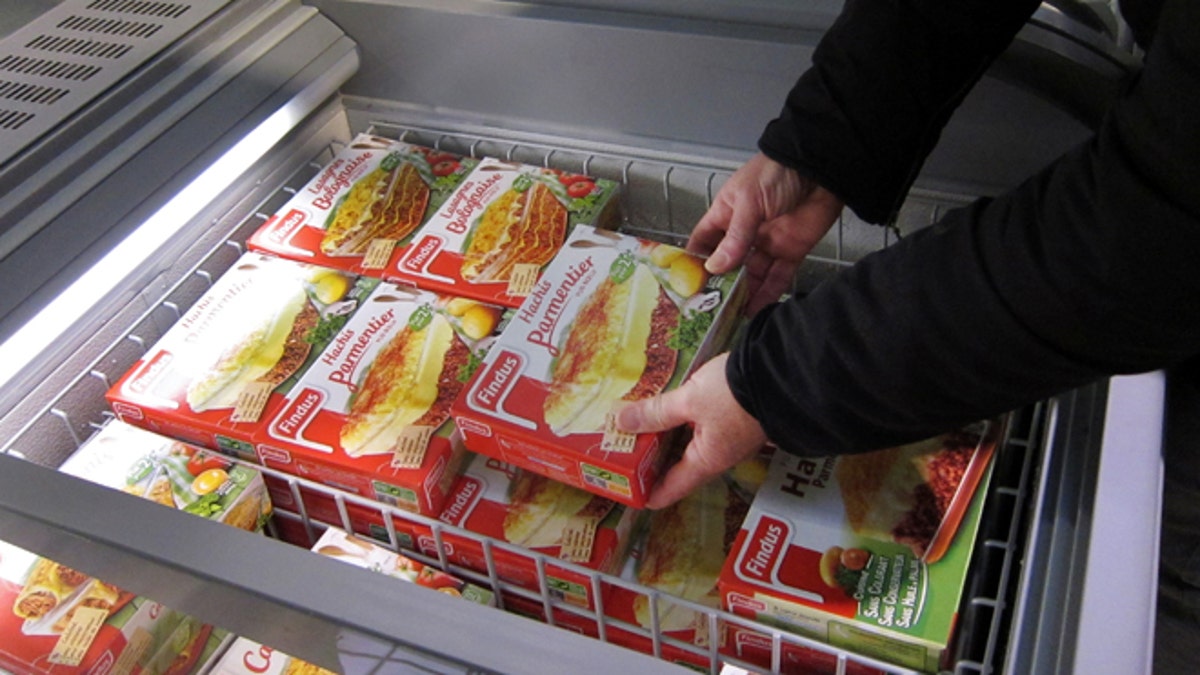
Feb. 11, 2013: A customer takes a pack of frozen beef Hachis Parmentier from a freezer in a supermarket in Nice, southeastern France. (AP)
PARIS – Stung by Europe's growing horse meat scandal, French farmers and food industry officials on Saturday were flocking to Paris to show off their wares and defend the reputation of the Western world's culinary heartland.
Paris' yearly Agricultural Salon is a bit as if the Iowa State Fair took up residence in New York City to advertise the virtues of red wine and goat cheese, as well as the latest in tractor technology. This year, there was one overriding preoccupation: how to ease fears that hidden horse meat has marred France's role as the paragon of haute cuisine.
Three-thousand animals and 700,000 visitors were expected to herd into the Paris convention center at the edge of the city. On Saturday's opening day, dictated by decades of tradition, French President Francois Hollande was among the first to check in, throwing his support behind the vaunted agriculture industry.
He spent 10 straight hours at the convention center, consuming his share of wine and cheese, kissing babies and shaking hands. But, hoping to restore confidence after horse meat was mislabeled and cooked into frozen dinners across Europe, Hollande also said he would press for continent-wide labeling rules on the meat in prepared foods.
The horse meat scandal began with tons of horse meat from Romanian abattoirs exported to France, where it was processed into ready-made meals. Romanian authorities said the meat was correctly labeled as horse and that the fraud occurred further down the food supply chain.
Since then, horse meat has turned up across Europe in frozen supermarket meals and in restaurants, schools and hospitals.
The fraud was possible "because there wasn't labeling," Hollande said. "Consumers should be able to know the provenance of the products they consume, especially for meats."
For many consumers, the scandal revealed the complexity of a food chain that few had given much thought — and the subsequent investigations, which continue weeks later, still have not fully traced the sources of all the meat in question.
"There is a need for traceability, that is what I want from talks on a European level," Hollande said.
Under current European rules, companies are supposed to indicate the kind of meat in prepared foods, but not its origins. Hollande said he expected it would take several months to persuade other countries to go along with the rule change.
The French frozen food manufacturer Findus was among the first companies to acknowledge the mislabeled horse meat, which was shipped from country to country before finding its way into prepared foods. Findus and grocery chains Carrefour and Intermarche said they would now use French beef exclusively in prepared foods for consumers.
Italy on Saturday registered its first case, with horse DNA discovered in pre-packaged lasagna from a Bologna-based food-maker, Primia. The meat was in the bolognese sauce.
France's agriculture industry, which relies heavily upon subsidies hard-won in the European Union budget, would be asked to label meats voluntarily and shore up confidence in their products, said Hollande.
Yves Berger, director-general of the Interbev association of livestock and meat producers, said he hoped the horse meat crisis would ultimately benefit French argriculture. Horse meat has long been a staple of French cooking.
"That is to say, the customers come back to cooking for themselves. It is not very difficult to make lasagna, Shepherd's pie. So, paradoxically, we're seeing a slight rise of the meat sales, including for horse meat."
The president also promised support for France's dairy farmers, who are struggling with a combination of low milk prices and high grain costs.
Wim Lohues, a 50-year-old dairy farmer from the southwestern area of Charente, spent a few minutes talking to the president about his problems.
"Hollande went through very quickly, I don't know if he really wanted to hear what we said," Lohues said.
The convention is a political requirement for all French presidents, who face tacit public judgment for their ability to face a cow in need of milking at the event, regardless of how urban French culture is in reality.
The president's every move is followed by cameras. Five years ago, then-President Nicolas Sarkozy was caught in a tense confrontation with a spectator who refused to shake his hand, ending with the president's famous rejoinder, "Get lost, jerk."
